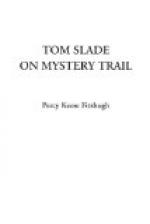This was too much for Tom. “Aren’t you coming back to camp with me?” he asked. “They’ll want to hear about your adventure. It’s getting pretty late, too.”
“Oh, I’m a regular night owl,” Hervey said. “You take Asbestos back to camp and hang him up in a tree and I’ll blow in later. I’m going on the war path for tracks. So long.”
Before Tom had recovered from his surprise, Hervey was picking his way along the rocky ledge at the base of the mountain, apparently oblivious to all that had happened, and intent upon a rambling quest for tracks. It was quite characteristic of him that he based his search upon no hint or well considered plan, but went looking for the tracks of a wild animal as one will hunt for shells, along the beach.
And there stood Tom, holding the memorial of Hervey’s heroism in his hand. Hervey had apparently forgotten all about it....
CHAPTER XII
AS LUCK WOULD HAVE IT
Hervey picked his way among the rocks, looking here and there in the crevices and upon the intervening ground as if he had lost something. A more random quest could scarcely be imagined. Tom watched him for a few minutes, then took the shorter way to camp with his little charge.
Hervey followed the rocky ledge for about fifty yards to a point where the dry bed of a stream came winding down out of the mountain. It ran in a tiny canyon between two rocks and so out upon the level fields to the south where the camp lay.
The twilight was well advanced now, the last vivid patches were mellowed into a pervading gray, which seemed to cover the rocks and woods like a mantle. Clad in this somber robe, the wooded height which rose to the north seemed the more forbidding. Not a sound was to be heard but the voice of a whip-poor-will somewhere. Even Hervey’s buoyant nature was subdued by the solemn stillness.
Suddenly something between the two rocks caught his eye. The caked earth looked as if a narrow board had been drawn over it. Bordering this broad line, about half an inch from it on either side, were two narrow fancy lines—or at least that is what Hervey called them. Examining these carefully, he saw that they were made up of tiny, diagonal lines. In the place where this ran between the rocks, in the deep shadow, these singular marks were surprisingly legible, and bore not a little the appearance of a border design. The big stones formed a sort of shadow box, causing the markings to appear in bold relief.
Hervey knew nothing of the freakish influence of light on tracks and trails, but he saw here something which he knew had been made by a moving object. The continuous design was so nearly perfect that it seemed like the work of human beings, but Hervey knew that it could hardly be this.
What, then, was it?
Where the lines emerged from between the rocks the marking was less regular and less clear, but plain enough in the damp, crusted earth which covered the mud in the old stream bed.




